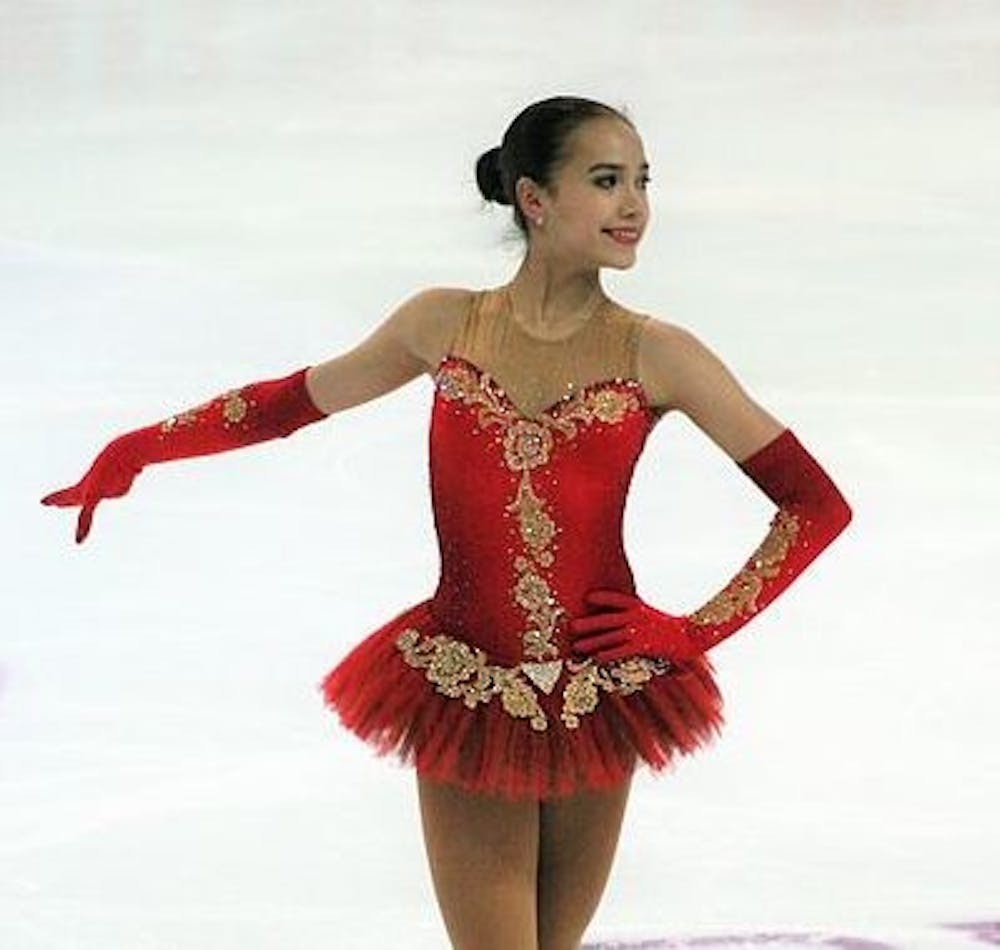Tonight marks the final figure skating event of the 2018 Winter Olympics: women’s long program. While the three Americans are likely out of contention for the podium, the gold medals favorites are Russian teens Evgenia Medvedeva and Alina Zagitova, both of whom hold world records.
As far as much of the media is concerned, the teammates, who train with the same coach, hate each other. After Zagitova completed an excellent long program during the team skating event, NBC commentators and former Olympic skaters Tara Lipinski and Johnny Weir made a point of questioning the sincerity of the hug Medvedeva gave her, citing that skaters are “good actresses.”
Slate ran a feature on the competitors this week entitled “Catty Olympic Fans Rejoice.” A Business Insider headline insisted the pair were “embroiled in the greatest rivalry since Nancy and Tonya.” Wrapped up such in coverage is the problematic and sexist notion that female competitors aren’t real rivals unless they hate each other. It’s not the sport that’s the focus, but the drama.
Now, admittedly, I saw I, Tonya last month in theaters. And I’m as big a Mean Girls fan as anyone. However, at the core of both movies are messages of sympathy, understanding and acceptance. That’s not the case in this media narrative. Bitter female rivalry, absent of such contextualization, remains a popular aesthetic as is evidenced by the coverage of Medvedeva and Zagitova’s Olympic journeys.
Think about it. When Michael Phelps competed against Ryan Lochte, the first question on everyone’s mind was not “How much do you think they hate each other?” The media coverage focused almost exclusively on their incredible feats as swimmers. Whenever their relationship was mentioned, it was described as a friendly rivalry and left at that. It was never used as an angle for coverage.
Medvedeva and Zagitova, by virtue of being women, have no such luxury. To be fair, their story has all the elements of a classic juicy story. Eighteen-year-old Medvedeva won back-to-back European Championships and World Championships after becoming a senior skater in 2016. Many considered her to be a lock for 2018 Olympic champion.
Then, last month, 15-year-old Zagitova won the European Championship. Medvedeva was still recovering from an injury at the time, but many commentators considered the loss a major upset. Zagitova was suddenly on the map in a way she hadn’t been before.
At the Olympics, the rivalry has continued. Both technically and artistically the skaters are evenly matched and well above the rest of the field. Both perform jumps during the second-half of their programs, receiving an automatic ten percent bonus for each element due to the increased difficulty of fighting fatigue. They also perform jumps with their arms above their heads, which is awarded because it throws off their centers of balance.
During Tuesday night’s short program, Medvedeva broke her own world record for highest short program score with an 81.61. Minutes later, Zagitova broke it with an 82.92. Those scores will be combined with their long program scores tonight determine who takes home the gold. Medvedeva holds the current world records for highest long program score and highest combined score, but Zagitova is clearly an equal contender.
Their incredible athleticism and beautiful artistry should be enough for commentators and viewers, and yet Medvedeva and Zagitova have continually had to address their relationship and refute the popular narrative because, guess what, they’re close friends.
Neither deny that a competition exists because, as Medvedeva said at a press conference after the short program, that is the essence of sports. But rivalry and friendship are not mutually exclusive.
“We are friends, we are girls, young girls. We can talk about everything to each other,” she said, according to ESPN. “When we take the ice this is sport and we must fight. In every competition I feel like a little war.”
Zagitova, who has cited Medvedeva as a role model, echoed the sentiment.
“We are friends first and rivals second, because you have to have competitiveness in sport,” she said. “During practice, during competitions, I get this feeling of rivalry. But it’s not bad or negative like a malicious feeling of rivalry.”
For more proof, Twitter has become a hub for fans to celebrate the skaters’ bond. One popular video shows the teens in a training room dancing in sync to a song by the K-pop band EXO. In another, Medvedeva is seen folding down the collar of Zagitova’s warm-up track suit jacket in a big sisterly fashion.
Following Russia’s second place finish in the team event, Zagitova was photographed putting the tiny hat worn by her plush tiger, which athletes have been receiving immediately after competitions in place of medals, on the head of a smiling Medvedeva.
It’s heartwarming to hear and see how much Medvedeva and Zagitova care about one another, but they shouldn’t have to defend themselves. They shouldn’t have to refute the idea that it’s paradoxical for women to be rivals and friends. It’s offensive — and harmful to young female athletes — to assume that they are not capable of not separating the two.
Catherine Palmer is a senior Writing Seminars major from Norristown, Pa. She is a Managing Editor for The News-Letter.
Correction: The Olympic Athletes from Russia placed second in the team event not first. Additionally, Medvedeva performs jumps throughout her long program, not only in the second half as previously stated.





